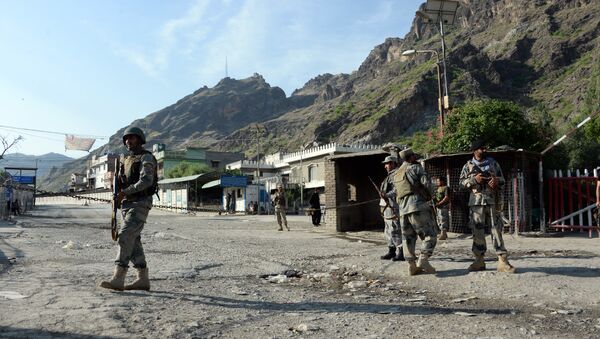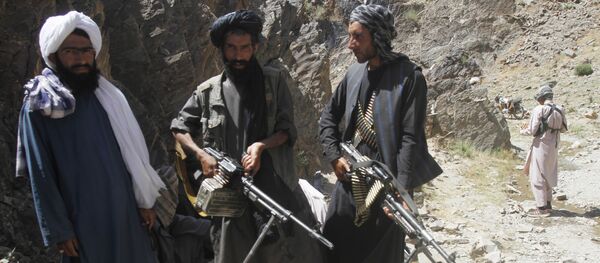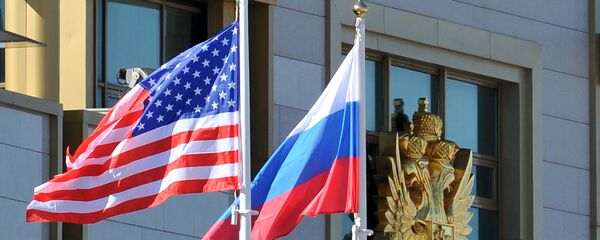New Delhi (Sputnik): Afghanistan witnessed two of the deadliest terror attacks in the beginning of 2018. At least 130 persons were killed and hundreds more were wounded in the attacks claimed by the Taliban. While the United States responded with heavy airstrikes against the Taliban and other militants in the north of the country, Russia made attempts to bring the Taliban to the negotiating table. Some Afghan officials also said they had kept channels of communications open.
Sputnik spoke to Vishal Chandra, a research fellow at the Institute for Defense Studies and Analyses (IDSA), New Delhi, on the current situation in Afghanistan. Chandra is also the author of the book 'The Unfinished War in Afghanistan — 2001 to 2014'.
Sputnik: What is happening in Afghanistan at the moment?
Vishal Chandra: Well the situation is quite precarious. You must have taken note of the several coordinated suicide attacks that were carried out in the capital Kabul in January. Several hundred people were injured. Almost 150 to 200 people were killed. So obviously Kabul is under tremendous pressure at the moment.
In his recent interview aired on CBS news, President Ashraf Ghani stated that Afghanistan will not be able to support its army for six months without the US support and US capabilities. Seven months earlier, in June 2017, President Ashraf Ghani invited representatives of 27 nations and international organizations for a meeting which was later dubbed as the Kabul Process. The meeting was largely futile. The second such meeting, I believe, will be held on February 28 and it would be keenly watched by the entire world.
READ MORE: Over 3,000 Civilians Killed, 7,000 Injured in Afghanistan in 2017 — UN Mission
During the first round of the Kabul Conference in June 2017, President Ashraf Ghani had claimed that he had offered the olive branch to Pakistan but Pakistan did not reciprocate. He also claimed to have tried all channels of negotiations including bilateral, quadrilateral and multilateral channels but Pakistan's response was lukewarm. What is most interesting is that Ghani's stance echoes the sentiments of the earlier generation of Afghan leadership including his immediate predecessor President Hamid Karzai. He says Afghanistan is yet to figure out what Pakistan actually wants and that it is the biggest challenge before his administration.
Sputnik: So what exactly is the situation like on the ground?
Vishal Chandra: President Ashraf Ghani had also shared some interesting facts and figures in his remarks at the June 2017 Kabul Conference. He said that the strength of foreign terrorists inside Afghanistan has increased from a couple of hundreds to almost 11 thousand since the end of the western combat mission in 2014. He also said that the Afghan Army is at the forefront of the war against terrorism as there are over 20 foreign terrorist groups currently active inside Afghanistan or along the Durand Line — the tribal frontiers of Afghanistan and Pakistan. In this backdrop, it is pertinent to note that the Pakistan Army launched an operation in the North Waziristan region — the operation Zarb e Azb in mid-2014.
Now, that was the time when the NATO forces, the American forces were in their last phase of withdrawal. They were vacating the forward operating bases along the Durand Line. So the Afghan Army which is still very nascent in terms of its development and organization was somewhere unable to fill in the vacuum.
They didn't have the kind of capacity that was required to take care of the security along those porous bordering areas, so obviously as a result of the operations Zarb e Azb, several of these militants, mainly foreign militant groups crossed over onto the Afghan side of the Durand Line including in parts of northeastern Afghanistan, Badakhshan, and areas in the south of Tajikistan bordering China's Xin jiang region. The Taliban are also far more stronger now in southern parts of the country, particularly in Helmand and there is a growing presence of the pro-Islamic state or Daesh groups up in the north particularly Sar-e-Pol and Jowzjan area. I think somewhere attempts are on to push the battle line deep inside Afghanistan, this is where we need to see whether Trump's strategy will work in terms of bringing about a fundamental change in Pakistan's behavior as he had spoken about in his address on August 21.
READ MORE: ‘We Are Surrounded’: 21 Terrorist Organizations Active in Afghanistan
Sputnik: Do you see a lack of international consensus as the main obstacle?
Vishal Chandra: Well, I think there is lack of consensus particularly among major powers active in the region in terms of clearly identifying the key sources of terrorism or state-sponsored terrorism. I think that is a major hindrance because there is no consensus when it comes to the kind of role that Pakistan has played over the decades inside Afghanistan, the proxies that Pakistan created, the proxies they have unleashed inside Afghanistan basically to undermine the legitimacy of the post-Taliban or let say post-2001 political system.
READ MORE: Afghanistan Needs a Regionally Coordinated Approach – Analyst
Now they have a very representative political system; they have a modern constitution and this system takes into account the contemporary social and political realities of Afghanistan. Unlike the previous system, this political system acknowledges the social-political diversity of the country. So somewhere, attempts aren't on not only push Taliban battle lines inside Afghanistan but at the same time, the idea is to undermine the current political system. I think this is where regional countries do not really have a very coherent approach particularly on the issue of state-sponsored terrorism in Afghanistan.
Sputnik: Our readers would like to know how active is Daesh today in Afghanistan? How is it different from the Taliban?
Vishal Chandra: Well I think some of the groups active on either side of the Durand line had shifted their loyalties towards Islamic State of Syria and Iraq or let's say Daesh, particularly, after reports about Mullah Omar's death in July 2015. So there was this confusion among some of these Islamist groups who had earlier expressed their allegiance to Mullah Omar now with reports of Mullah Omar having died 2 years back in 2013. There was a leadership crisis within the Taliban movement. The Taliban, at that point in time, maybe, it didn't have the kind of appeal that Daesh had because Daesh had a territory to itself by 2015-16. So some of these foreign militants groups including factions of the Tehrik e Taliban — Pakistan, they had expressed their loyalty to the chief of the Islamic state.
I think it was in 2015 that Daesh had announced the establishment of the Khurasan chapter. The Daesh Khurasan chapter included Afghanistan in Pakistan. Khurasan is a historical term for a territory which includes ancient Afghanistan, Pakistan, and parts of Turkistan, and India. But in terms of orientation, I don't see a major difference between Taliban and the local Daesh elements.
Regional countries need to be very careful because there are countries, who might be taking a favorable view in terms of you, know bringing in Taliban into the political process.
Well there is a consensus that the Taliban needs to be engaged, but then there are various groups within the Taliban and Taliban at the movement are not in a mood to talk to the Afghan government, they don't accept this government, they do not accept this constitution. But since they have been able to capture certain areas inside Afghanistan, obviously they are likely to have a greater appeal then Daesh because Daesh centers have been destroyed in Syria and Iraq.
Sputnik: Do the Americans approach Taliban and the Islamic state differently?
Vishal Chandra: See both have similar objectives and similar recruitment pool. Both want to overthrow the Afghan government. Both want to replace the current Islamic Republic of Afghanistan with Islamic Emirate of Afghanistan. Both believe in ideologies that do not want to give choices to the people. Both do not acknowledge the value of the people's will, people's voice and rights. Their worldview is too narrow and too myopic and too constricted to grasp the contemporary social and political realities of Afghanistan. There is a view in certain countries that Americans are supporting pro-Daesh elements inside Afghanistan, maybe to counter the Taliban. But I do not really agree with the view because you see the top 3, the first 3 commanders of Daesh in Afghanistan were eliminated by the Americans. All the 3 chiefs of the Islamic state in Afghanistan were eliminated by the Americans. So, somewhere the two do not add up. So I think that Americans do not really have any stakes in empowering Daesh to counter Taliban.
Sputnik: You would know the Pentagon has deployed their approximately 3,000 additional troops in Afghanistan as per the US president Donald Trump's revised strategy for the war-torn country. Has the American policy failed to bring peace Afghanistan? What will change now?
Vishal Chandra: Well I think it is too early to be judging president Trumps strategy. It is still in the work; it is still being implemented. They have cut off of military aid to Pakistan; they are tightening the financial noose over Pakistan. Recently there were reports that they are trying to designate Pakistan as a part of the financial task force the meeting of which is coming up in Paris. I think efforts are on to convince Pakistan that they need to change their approach and behavior towards Afghanistan; they need to move against terrorist sanctuary; they need to move against groups that are attacking Afghan men, women, and children.
READ MORE: Is There a 'Secret US Hand' Supporting Daesh in Afghanistan?
What is noteworthy is that unlike his predecessors, President Trump has refused to lay down a timetable for withdrawal of forces from Afghanistan. Now that must have upset the calculation of Haqqani-Taliban network which may have been working on a post-West scenario. Now there is nothing called a post-West scenario because President Trump has announced the additional deployment of troops.
Sputnik: Do you see America's approach bearing fruit anytime soon?
Vishal Chandra: There is this view that there are no military solutions. I don't think Americans are looking for a military solution. They are using the military as a tool to create an atmosphere conducive for talks between the Taliban leadership based in Pakistan and the Afghan government. I think we need to give little more time to President Trump. Moreover, for the first time, Americans are trying to address the sources of terrorism in the region. If you look at Obama's strategy or President Bush's strategy, it was more focused on destroying and dismantling al-Qaeda in the region. But Trump's focus is on destroying and dismantling al Qaeda and other international terrorist networks including Islamic state but at the same time, he is trying to put pressure on the Taliban.
There are efforts to find a common ground where they can work together because I don't think that Pakistani are going to give up on US or US can afford to give up on Pakistan. So, both are struggling to redefine the templates of their future engagement.
Sputnik: What is your take on the Russian efforts in Afghanistan?
Vishal Chandra: Well, one cannot think of Asian security without Russia, as a major power and also, of course, a permanent member of the UN Security Council. I think Russia is too critical for the Asian stability and security. Russia in my view is a major knowledge power. I think that needs to be acknowledged more within the region. It is known for its tremendous scientific and intellectual achievement and this is what the region needs now. This is what Af-Pak region needs. Russia in my view could play a major role in reviving the scientific temper among the youth as a part of the much wider and a more coherent effort to develop an effective counter-narrative to the militant extremism and terrorism that threaten every country in the south-central Asia region and beyond including Russia.
READ MORE: Italian Ex-PM Berlusconi Claims He Helped End Cold War… in 2002
But somewhere I feel that post-cold war the failure of both west and Russia to reset their ties seems to be overshadowing the broader, wider geopolitics that we are seeing in Asia. I think it is very important for the US and Russia to find ways to work together because of both need to gear up for the kind of challenges that are emerging in the 21st century from these international terrorist networks.
Sputnik: What is your view on the initiation of peace talks with the Taliban by Russia?
Vishal Chandra: Well, I think unfortunately I think the region is too tolerant towards state-sponsored terrorism. See, it is the Afghan Army which is at the forefront of the war against terrorism and I think any effort that undermines the legitimacy of the Afghan government and the Afghan political structure; one has to be very careful about such initiatives because Taliban are not willing to accept the Afghan constitution, they do not recognize the Islamic Republic of Afghanistan and they are bent on imposing Islamic caliphate on Afghanistan. So, that should not leave us with too many choices and so I think an effort should be geared at building the strength of the legitimate institutions in Afghanistan.
Sputnik: Last year the area under opium cultivation in Afghanistan increased by 63% while opium production itself rose by 88%. This is the data of the UN office on drug and crime. What are the efforts being made to curtail illegal drug trade? Has the western collation failed to put a brake on it?
Vishal Chandra: Yes, the western collation has certainly failed in addressing the drug's menace because their priorities were simply different. President Bush sent his forces to Iraq within a year of the fall of the Taliban regime in Afghanistan. There was this view that they have got rid of Taliban and that they can afford to shift their resources and their attention to Iraq. And some of the golden years, some of the best years that could have been devoted to rebuilding political structures to strengthen the capacity of the Afghan state were lost.
That's a very difficult task and that is where you know I believe somewhere Americans and Russians need to work together and perhaps if possible with Beijing too because counternarcotics has to be a part of a broader regional effort. There was a level of cooperation earlier. I think that cooperation needs to be revived because it's just not about Afghanistan.
READ MORE: Hashish Becoming a Main Source of Income for the Taliban
Afghan conflict is not just about groups trying to control territory it's also about controlling the lucrative drug trade. It is also said that 65 % of the finances for the Taliban comes from the drug trade. The Iranians too have a stake here. But I am not sure if Americans and Iranians because of the tension in their bilateral ties can work together. But definitely, other countries can work together. The American President in his strategy made it very clear that the war in Afghanistan is not going to be micromanaged from Washington. but I think somewhere he needs to do some micromanaging and in terms of engaging other regional countries, other neighbors of Afghanistan who have stakes in the stability of Afghanistan. If one is talking about and dealing with the drug menace, here again, I would like to emphasize the importance of protecting the Afghan state institutions, the importance of building capacities of the Afghan state. We need a strong government; a government which acknowledges the diversity of the country. The Taliban and the Haqqani's don't have a national vision, their world view is myopic. So obviously and if you look at the Afghan constitution you see 25 % seats are reserved for the Afghan women in the lower house of the Afghan parliament. I think 17 in the upper house. Almost all major ethnicities of Afghanistan are mentioned in the Afghan constitution in their national anthem. Now, this is a very different Afghanistan. This is not the Afghanistan of the 60's or the 70's where a group of the elite would dominate from south to dominate the politics. Obviously, this constitution somewhere takes into account the diversity of the country and that something we need to strengthen because unless Afghan institutions are strengthened, they cannot be any effective counter-narcotics initiatives in Afghanistan.
Sputnik: Where does India stand in the Af-Pak situation today?
Vishal Chandra: Well, I think India and Afghanistan — the two countries enjoy very stable, very robust and a dynamic bilateral relationship. We (India) were the first country to formally established a strategic partnership with Afghanistan and that too at a time when the US and NATO were preparing to minimize their engagement in Afghanistan. I would say that despite several constraints and challenges India remains determined not only to the Afghan cause but to further build on its development partnership with the Afghan people. Today we are a major contributor from the region. I think the 5th largest in the Afghan reconstruction. We have committed almost 3 billion dollars towards Afghan reconstruction and last year when Afghan foreign minister was here our foreign minister announced 116 high impact community development projects which will be implemented in 31 of the 34 provinces of Afghanistan. So in the last 16 years, India as you know, carried out several and quite successfully, several large medium and small development projects spread across Afghanistan.
READ MORE: Female Afghan Army Officers to Learn Warfare Tactics in India
We have been extremely innovative in terms of diversifying our assistance and training programs as per the changing situation and specific requirements of the Afghan people. We are also working very closely with Iranians and the Afghans to develop to upgrade the Chabahar port and the first consignment of the freight that we had sent later last year has already reached Kabul. We have also set up an air cargo corridor connecting Afghanistan's Kabul and Kandahar with India and we are already receiving supplies of fresh fruits and other goods from Afghanistan through this air corridor.
India has been training Afghan military officers and cadets and also doctors arriving at its military academies every year. We have also announced additional 500 scholarships over and about 2000 scholarships offered under the ICCR special scholarships scheme for Afghan nationals, for the next of the kin of the martyrs of the Afghan national security forces and we already assisting in the establishment of Afghan national agriculture sciences and technological university in Kandahar. We have already made it clear that there are no exit options for us and what works in the interest of Afghanistan is in our interest. I think that's the best way I can describe Indo- Afghan relationship.
The views and opinions expressed by Vishal Chandra in this article are those of the speaker and do not necessarily reflect the position of Sputnik.





